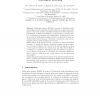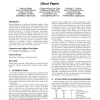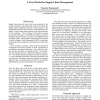47 search results - page 9 / 10 » Game Theory and Adaptive Steganography |
149
click to vote
LAMAS
2005
Springer
15 years 6 months ago
2005
Springer
Abstract Multi-agent systems (MASs) is an area of distributed artificial intelligence that emphasizes the joint behaviors of agents with some degree of autonomy and the complexiti...
107
click to vote
ATAL
2008
Springer
15 years 3 months ago
2008
Springer
Reward shaping is a well-known technique applied to help reinforcement-learning agents converge more quickly to nearoptimal behavior. In this paper, we introduce social reward sha...
114
click to vote
KDD
2004
ACM
16 years 1 months ago
2004
ACM
Essentially all data mining algorithms assume that the datagenerating process is independent of the data miner's activities. However, in many domains, including spam detectio...
110
click to vote
AAAI
2010
15 years 5 days ago
2010
hey generalize these factors to the abstract concepts of ability, integrity, and benevolence. This model does not use probabilistic decision theory. Other SCM trust factors have be...
120
click to vote
STOC
2004
ACM
16 years 1 months ago
2004
ACM
The Collect problem for an asynchronous shared-memory system has the objective for the processors to learn all values of a collection of shared registers, while minimizing the tot...



